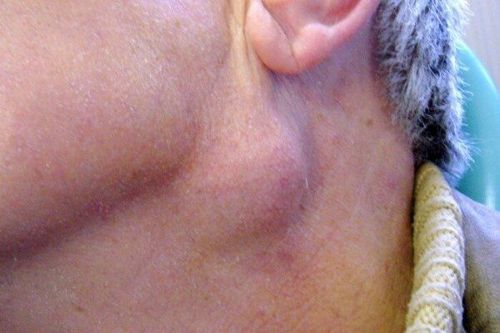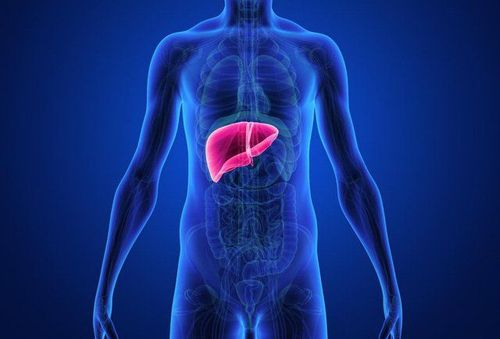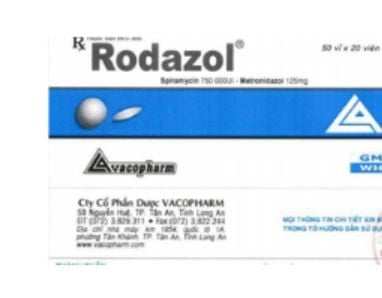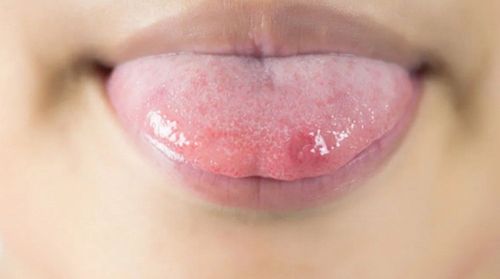This is an automatically translated article.
Tongue cancer is a type of oral cancer that usually develops from squamous epithelial cells on the surface of the tongue and manifests as a tumor or ulcer. The most noticeable signs of tongue cancer are non-healing sores on the tongue and tongue pain.
1. Manifestations of tongue cancer
In the early stages, symptoms of tongue cancer are often vague and easy to miss. They are not clear and easily confused with common diseases that make many patients subjective and do not go to the doctor.
Only when the disease has progressed so much that the symptoms are rampant. Symptoms that may occur in the early stages of tongue cancer include:
Tongue discomfort: this sensation is like a foreign body or fishbone stuck in the tongue but only transient. There is a raised mass on the surface of the tongue: color change, white mucosa, firm, solid lesion, can be in the form of fibrosis or small ulcer. Some people may have swollen lymph nodes in the neck. People who suspect they may have tongue cancer should get a tongue cancer screened as soon as possible. If detected early, patients can be treated with simple methods such as gargling with 0.2% Chlorhexidine gluconate solution, applying medication and taking anti-inflammatory drugs.

Bệnh nhân nên đi khám sàng lọc ung thư nếu thấy dấu hiệu bất thường trên lưỡi
2. Subjects needing screening test for tongue cancer
Tongue cancer is common in:
People over 50 years old, most of which are men. People who have poor oral hygiene, often smoke, drink a lot of alcohol, have a habit of chewing betel nut or infected with viruses such as HPV... Especially, men have chronic gum disease whether they smoke or smoke. does not also increase the risk of tongue cancer . Along with that, studies have also shown that the rate of tongue cancer is higher in men than women, especially those who regularly smoke, drink alcohol, the risk of tongue cancer is higher.
According to statistics, men over the age of 50 are most likely to get tongue cancer, so these people need to be screened for tongue cancer periodically at least once a year.
For people under 50 years old, depending on their health condition or have abnormal signs, they also need to see a doctor for timely treatment.

Nam giới trên 50 tuổi với các bệnh lý răng lợi mãn tính có nguy cơ cao bị ung thư lưỡi
3. Methods of screening for tongue cancer
Tongue examination is one of the most common screening methods for tongue cancer. Examination of the tongue will help patients detect abnormal signs such as:
bulging spots with color changes on the tongue, white mucous membranes, lesions are small ulcers, fibrosis. Lesions are characterized by feeling firm, solid, and not as soft as usual to the touch. Manifestations of tongue cancer in the late stage are ulcers in the tongue spreading, covered with pseudomembranous layer on top of easy bleeding, causing the tongue to be restricted in movement, unable to move. Lesions are ulcerated, with pus at the bottom, blood, jagged edges, bleeding on impact. There are cases where there is no sign of ulceration, but a large nucleus is formed, firmly attached to the lower layer, protruding under the mucosa with light purple color, smooth stretch, the mucosa is pitted with small holes, when pressed, it will leak out a small amount of blood. white matter, the product of necrosis at the bottom. Examination of lymph nodes: Lymph nodes often appear early, the rate of people with tongue cancer having lymph nodes at the beginning is about 50%. The lymph nodes usually appear under the jaw, under the chin, in the upper quadrant. Depending on the invasion of the primary tumor, the possibility of regional lymph node metastasis ranges from 15-75%.

Nổi hạch là biểu hiện phổ biến nhất ở giai đoạn đầu của ung thư lưỡi
Biopsy: before treatment, confirm the diagnosis by histopathology through the biopsy piece at the tumor. To find malignant cells in the tongue lesion by applying a slide to the lesion of the tongue or looking for malignant cells in the lymph nodes, the doctor will perform a fine needle aspiration of the abnormal lymph nodes in the neck.
In addition, a number of other methods are used to screen for tongue cancer such as:
Mandibular bone scan: to evaluate invasive bone lesions. Cardiopulmonary imaging: a chest scan to assess the possibility of disease metastasis. CT - Scanner, ultrasound and MRI: invasive assessment of surrounding soft tissue, bone tissue and cervical lymph nodes. Whole body scintigraphy: detecting distant metastases. Tongue cancer can be prevented through good oral hygiene. Giving up bad habits such as quitting smoking, limiting alcohol, quitting the habit of chewing betel nut, ... also contributes to reducing the risk of tongue cancer.
The early signs of tongue cancer are often quite faint and easy to ignore, early detection of the disease has a great influence on the outcome of treatment. Therefore, if you detect early symptoms, suspect disease, you should see a doctor and get an early diagnosis. In addition, subjects with high risk of disease should also regularly screen for cancer, in order to detect the disease early.
Currently at Vinmec International General Hospital, there are General Health Checkup and Cancer Screening services, which help you quickly detect any health problems to quickly treat and prevent complications. bad happens. To register for medical examination and consultation, you can contact HERE.













